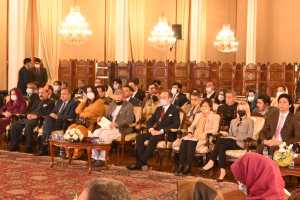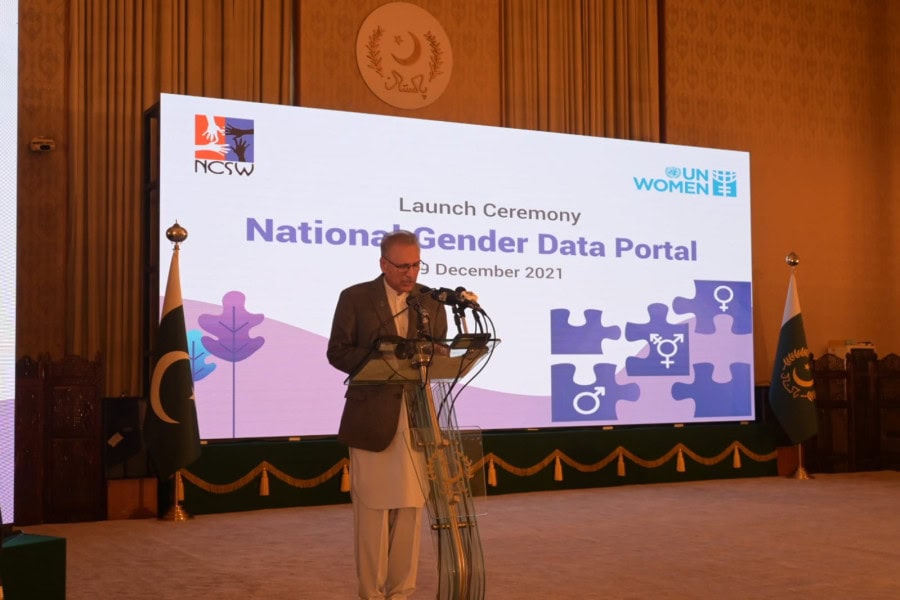ISLAMABAD – President Arif Alvi Thursday inaugurated the landmark digital tool ‘National Gender Data Portal’ developed by UN Women and the National Commission on the Status of Women (NSCW) to collect data on gender statistics.
This is the first digital platform that will serve as a one-stop-shop repository for high-quality data and evidence from across the country on more than 400 qualitative and quantitative indicators under ten themes including demographics, education, health, economic empowerment, violence against women, access to justice, elections and political participation, disabilities, poverty, and social protection and response to emergencies.
Pakistan has made significant strides towards amplifying its social safety networks and reaching marginalized groups particularly women and girls through programmes such as Ehsaas and Benazir Income Support Programme.
However, this progress has not been captured in data used by global indices, and thus, Globally Pakistan seems to be performing dismally on gender related indicators.


The NGDP will provide a counter-narrative to such portrayals, through reliable and comprehensive data as well as highlighting areas of excellence that will paint a more accurate picture of the situation on the ground.
Such data collection and analysis will also enable government institutions and other stakeholders to make the best possible evidence-based policy decisions that can target the areas where the need is greatest. Lastly, the NGDP will make it easier to report on Pakistan’s international commitments relating to gender, like CEDAW and SDGs. Altogether, the NDP will accelerate commitments towards gender equality initiatives, strengthen collaboration to ensure that no one is left behind, and promote a counter-narrative to improve Pakistan’s image globally.
President Alvi applauded the efforts and shared hope that filling data gaps at a national level will inform stakeholders of the challenges on the ground in advancing the gender equality agenda as well as highlight success stories for Pakistan.
“Data is of paramount importance as it guides on the kind of interventions that need to be done. I thank the presence of the international community and other parliamentarians at this pivotal event.”
Dating back to an idea envisioned at the 14th Inter-Provincial Ministerial Group Meeting held in October 2019, followed by two years of unrelenting efforts and productive consultations with provincial, national and international stakeholders and experts, this dynamic digital platform for collecting gender statistics and compiling a knowledge hub of global, national, and regional resources on gender equality and women’s empowerment has now been developed.
Nilofar Bakhtiar said during address mentioned the importance of having consolidated gender data on one platform. She also raised awareness on the number of initiatives that were done during 16 days of activism this year.
Mr. Julien Harneis, Resident Coordinator of the United Nations of Pakistan, shared that the Sustainable Development Goals (SDGs) are a historic global compact to achieve gender equality by 2030 and that is only possible through relevant, gender-sensitive data. “The availability of data is important to drive social change which will be trickled down to the provinces to make improvements on the ground.”
Additional Secretary (UN & ED), Ministry of Foreign Affairs, Nabeel Munir, added, “With so many parallel reporting international structures and overlapping obligations, it is important to develop a reporting mechanism amongst various federal and provincial stakeholders, based on data collection and correlation. NGDP would help in better coordination in this regard.”
As of November 2021, the NGDP has been finalized and beta-tested after the initial data entry from existing sources. Focal persons in the Women Development Departments of each province have been appointed and oriented to check and enter provincial data which will be collated nationally through the NGDP.
A National Report on the Status of Women in Pakistan is being developed by NCSW and UN Women, based on the initial data entry in the NGDP, which will be finalized in early 2022.










